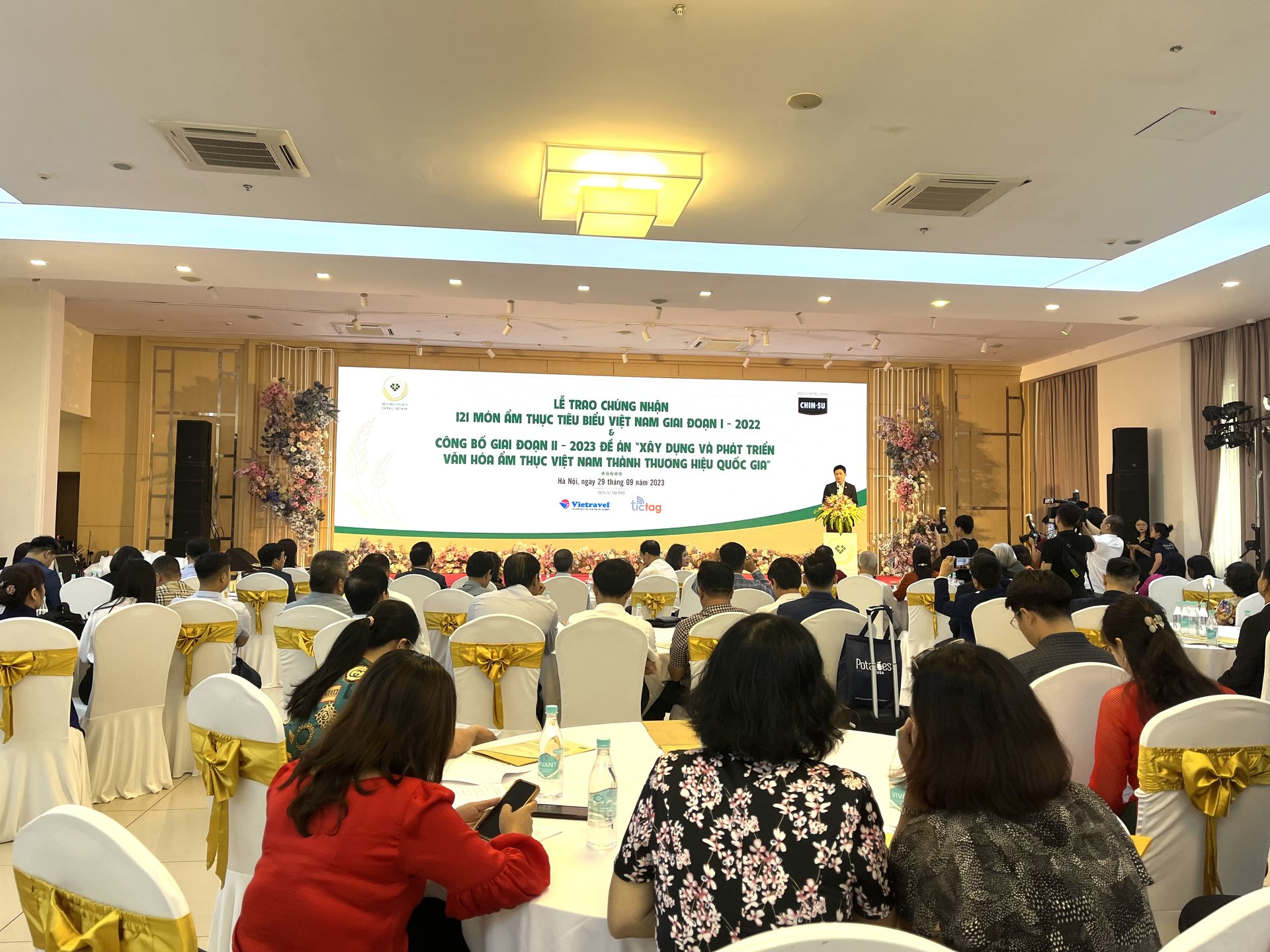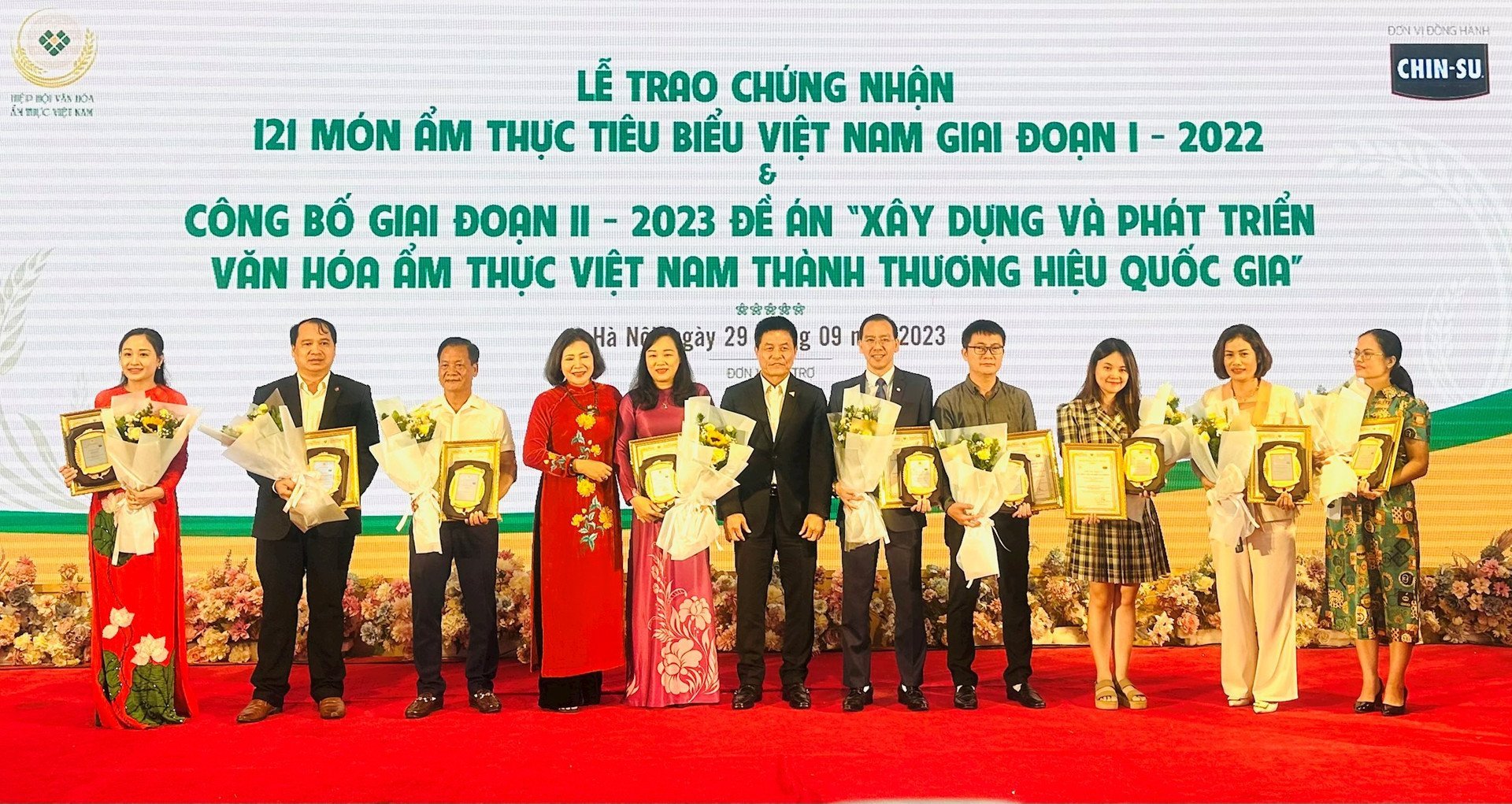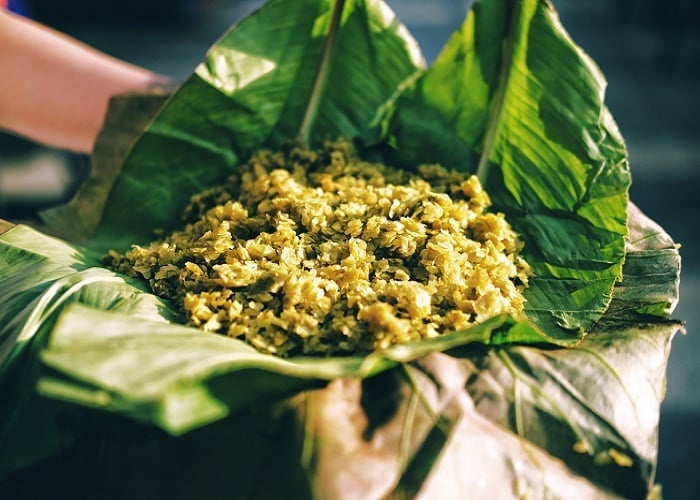May 21, 2025 | 04:13 GMT +7
May 21, 2025 | 04:13 GMT +7
Hotline: 0913.378.918
May 21, 2025 | 04:13 GMT +7
Hotline: 0913.378.918
The Vietnamese Culinary Culture Association (VCCA) organized a certification ceremony to celebrate 121 exemplary culinary dishes in Phase I-2022 and announced Phase II-2023 of the "Building and Developing Vietnamese Culinary Culture into a National Brand" project on September 29 in Hanoi,
During the opening speech at the certification ceremony, Mr. Nguyen Quoc Ky, Chairman of VCCA, stated that with the aim of exploring, restoring, preserving, promoting, and elevating the Vietnamese culinary culture to new heights, as well as turning cultural heritage into national assets, VCCA has launched the project on "Building and Developing Vietnamese Culinary Culture into a National Brand from 2022 to 2024."

The certification ceremony for 121 exemplary culinary dishes in Phase I-2022, organized by the Vietnamese Culinary Culture Association (VCCA), took place on the morning of September 29 in Hanoi. Photo: Hong Tham.
Accordingly, the project aims to conduct surveys and collect data on Vietnamese culinary culture to build the "Collection of 1,000 Exemplary Vietnamese Culinary Dishes" and transform this data into an "Online Culinary Map of Vietnam" and an "Online Museum of Vietnamese Cuisine." The products of this project will contribute to introducing Vietnamese brands to the world through culinary culture, promoting national competitiveness, and laying the foundation for Vietnam's economic development.
"During Phase I-2022, the project received 421 nominations for culinary dishes from 60 out of 63 provinces and cities throughout the country. VCCA has selected 121 exemplary Vietnamese culinary dishes to honor on this day, including 47 dishes from the Northern region, 37 from the Central region, and 37 from the Southern region," Mr. Ky added.
Ms. Dinh Hong Van, Senior Marketing Director at Masan Consumer Holdings - Chin-Su, stated, "Vietnamese culinary culture is a distinctive feature shaped by its history, lifestyles, and regional eating habits spanning from the North to the South. Our S-shaped country is divided into three regions, so Vietnamese cuisine is also divided into Northern, Central, and Southern regions, each with its unique characteristics."
According to Ms. Van, Vietnamese culinary culture has been a lively topic of discussion throughout history. It goes beyond just dishes, recipes, and ingredients; it embodies a natural cultural essence that has developed in daily life. Each Vietnamese dish is harmonious in terms of color, flavor, resulting in aa well-balanced and irresistibly appealing culinary experience.
"This recognition of 121 exemplary culinary dishes from provinces and cities all over the country is evidence that Vietnamese culinary culture is a source of pride as well as a top priority for localities," Ms. Van emphasized.
According to Mr. Nguyen Le Phuc, Deputy Director of the Vietnam National Authority of Tourism, the cultural heritage of Vietnamese cuisine, which has been formed over its long-standing history, captivates the hearts of tourists traveling across the beautiful S-shaped land. Many famous Vietnamese dishes including pho, bun cha, banh mi, and nem have been honored by world organizations, culinary magazines, and international media channels.

Representatives from the organizing committee awarding certificates to exemplary Vietnamese culinary dishes for Phase I-2022. Photo: Hong Tham.
According to Mr. Phuc, due to the trend of increasingly diverse tourism demands, culinary tourism not only serves as a simple provision of food and drinks for tourists but is also identified as one of the main purposes of travel.
"The strategy for Vietnam's tourism development until 2030 has identified culinary tourism as one of the pivotal product lines, contributing to enhancing Vietnam's competitive advantage and its tourism brand," Mr. Phuc emphasized.
Mr. Phuc also shared solutions to effectively exploit the potential and advantages of culinary tourism in Vietnam. Accordingly, the Vietnam National Authority of Tourism aims to build attractive and high-quality culinary tourism products. This goal involves emphasizing the experiences and exploration of the cultural essence and community life for each destination in association with specific dishes and beverages. The Authority recommends stakeholders to focus on sharing about the dining spaces and traditional dining etiquettes of the Vietnamese people to tourists. These efforts aim to elevate the culinary tourism journey to a new level and promote the beauty of Vietnamese culinary culture.
"In addition, the tourism industry also encourages the extensive promotion of Vietnamese culinary culture to the world through international events held in Vietnam and abroad, especially in key markets for Vietnamese tourism," Mr. Phuc added.
At the certification ceremony for 121 exemplary culinary dishes for Phase I-2022, Mr. Chu Hong Minh, Deputy Secretary-General and Head of the Office of VCCA, presented an overview of the project on "Building and Developing Vietnamese Culinary Culture into a National Brand."
Mr. Minh emphasized on the VCCA Chairman Nguyen Quoc Ky's remarks: "Vietnamese culinary culture is an invaluable treasure. Conducting surveys, discovering, and collecting data on Vietnamese culinary culture is a milestone to introduce the Vietnamese brand to the world through culinary culture, promote national competitiveness, and serve as a foundation for Vietnam's economic development."
Mr. Minh stated that the project aims to bring benefits to various stakeholders in three main areas: nutrition science, culinary economics, and culinary culture.
"According to estimates by the World Food Travel Association, international tourists allocate approximately 25% to 35% of their travel budgets to expenses related to food and beverages throughout their travel journey," said Mr. Nguyen Le Phuc, Deputy Director of the National Tourism Administration of Vietnam.

"Vong Village green rice," one of the 121 exemplary Vietnamese culinary dishes in Phase I-2022. Photo: Bytuong.
The project planned to collect data on 300 exemplary Vietnamese dishes and select 100 outstanding local culinary dishes recognized by the VCCA's expert council in 2022.
Subsequently, the project aims to collect data on 1,000 culinary dishes and develop a comprehensive database of Vietnamese cuisine in 2023. These activities will help VCCA select the most representative and popular dishes from different regions of Vietnam to establish an entrepreneurship model in collaboration with VCCA experts.
During the 2023 phase, the project will also support local governments in organizing events and activities to promote the development of the culinary culture ecosystem. Consequently, it will gradually shape the strategy for the development of local culinary culture.
Furthermore, the project will digitize the database into an "Online Culinary Map of Vietnam" in 2024. On the other hand, it will work towards creating a 3D virtual reality Culinary Museum and a physical Culinary Museum for future tourist visits in response to interest from provinces and investors.
Nguyen Le Phuc evaluated, "The certification ceremony for the 121 exemplary culinary dishes in Phase I-2022 is an important event that highlights the outputs of the project's activities. It encourages VCCA as well as organizations and individuals to fufill their visions and missions, as well as contribute to the development and promotion of culinary culture in association with tourism."
With the goal of shaping the local culinary culture ecosystem in Vietnam in addition to creating values and benefits for localities, VCCA hopes that relevant government agencies, sectors, and communities will collaborate and support the project in completing its assigned mission. With coordination, they aim to promote the development of Vietnamese culinary culture, making a strong contribution to economic development and preserving the cultural identity of Vietnam.
Translated by Nguyen Hai Long

(VAN) Japan's grant aid project contributes to capacity building, promoting organic agricultural production, and fostering sustainable community development in Dong Thap province.

(VAN) For years, the CRISPR-Cas9 genome technology has been reshaping genetic engineering, a precision tool to transform everything from agriculture to medicine.

(VAN) Vietnam aims to become a 'leader' in the region in the capacity and managing effectively soil health and crop nutrition.
![Reducing emissions from rice fields: [Part 1] Farming clean rice together](https://t.ex-cdn.com/nongnghiepmoitruong.vn/608w/files/news/2025/05/05/z6509661417740_a647202949c539012a959e841c03e1d3-nongnghiep-143611.jpg)
(VAN) Growing clean rice helps reduce environmental pollution while increasing income, allowing farmers to feel secure in production and remain committed to their fields for the long term.
/2025/05/19/5136-1-144800_230.jpg)
(VAN) The Nghe An Provincial People's Committee has just approved the list of beneficiaries eligible for revenue from the Emission Reductions Payment Agreement (ERPA) in the North Central region for the year 2025.

(VAN) 14 out of 35 domesticated elephants in Dak Lak province have had their living conditions improved, with 11 of them currently participating in the non-riding elephant tourism model.

(VAN) Muong Nhe Nature Reserve hopes that being upgraded to a national park will lay the foundation for forest protection efforts to be carried out in a systematic, modern, and sustainable manner.